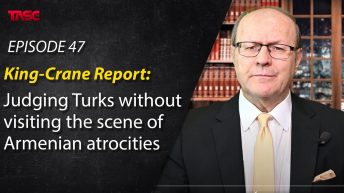In Episodes 63 and 64, I shared with you a remarkable letter titled Strategically Mum: The Silence of Armenians, written by Iver Torikian, an honest Armenian truth-seeker, wondering why there was so much misinformation about Armenian-Turkish relations and why Armenian insurgents and Turkish suffering they caused are never mentioned in Armenian writings.
The Center for Eurasian Studies, or AVIM by its Turkish acronym, a research group in Ankara, Türkiye, published that letter in its August twenty-twenty-one issue, because of the sincere views presented with academic objectivity and integrity. That letter triggered our discussion here of social concepts like propaganda, perception management, prejudice, and gaslighting on one hand and psychological concepts like groupthink, cognitive dissonance, and critical thinking on the other.
A simple definition of propaganda is spreading false information to promote or defame a cause. Propaganda dates to the missionary activities of the Catholic church in 1622, but its first used effective use was during the First World War as a formidable psychological weapon to influence people. Thereafter, it was constantly perfected, reaching a high point in Nazi Germany. Alfred and Elizabeth Lee in their 1990 book Sociology for People, classified propaganda devices into seven major categories:
1) Name-calling: To arouse an instant hostility. Examples are “genocide denier,” “fascist,” “ultra-nationalist,” “war-monger,” and many others.
2) Glittering generalities: The Armenian propagandist uses some alluring but misleading ideas to impress people, like “unarmed, peaceful, and loyal Ottoman-Armenians,” totally ignoring Armenian revolts, terrorism, treason, and the resulting Turkish suffering.
3) Transfer: When the Armenian Cause is presented as an integral part of a larger cause, such as the concept of Armenia being the first Christian nation, which is a falsehood. It was Ethiopia, since 330 A.D, as clarified in the 2012 book Abyssinian Christianity written by Portella and Woldegaber.
4) Testimonials: The Armenian propagandist promotes a fallacy by dropping the name of some distinguished person like a U.S. president, politician, or celebrity. President Wilson, who uncritically took every Armenian claim at face value, provides a good example.
5) Plain folks: The Armenian propagandists profess at cultural events that they are just like the plain folks and identify with their common virtues and vices while spreading fallacies.
6) Card stacking: The facts are twisted by the Armenian propagandist to suit the Armenian cause. The Van revolt by the Ottoman-Armenians is a good example where Armenians claim they only defended Van, whereas they caused the deaths of 194,000 Muslims, according to page 246 of Professor McCarthy’s book The Armenian Rebellion at Van.
7) Bandwagon: The Armenian propagandist touts to an unsuspecting person that since everybody is agreeing with Armenians, he or she might as well do so, too. Whereas people who succumb to Armenian intimidation are not aware that the Armenians hide half the story and falsify the remaining half.
Torikian has realized that many Armenians are prejudiced, particularly towards Turks. A young Armenian cousin in Kinali, Türkiye confessed that he hated all Turks. The wife of an old Armenian friend of his dad in Paris, France demanded that Torikian promises her that he would never marry a Turkish girl. Another Armenian cousin in Canada told Torikian that the cousin believed that Hitler did the right thing by trying to exterminate the Jews. It turned out that the cousin hated Jewish people as well as Turkish people. “Jews are the small rat. Turks are the big rat,” the Armenian cousin said. Throughout his life, Armenians have been kind to Torikian, including the people in the three incidents, which makes it difficult for Torikian to understand how people can simultaneously be nice to him while hating people they have never met. Some Armenians want an apology from the Turkish government, while others, reparations. Still, others want the Turkish government to carve a large part of eastern Türkiye and hand it over to Armenia on a gold platter. Such extreme demands, of course, are ludicrous, for many reasons. Torikian does not support any part of the Armenian Cause, as they all foster vindictiveness towards Turks and Türkiye. Furthermore, Torikian believes, that demanding anything from the present generation of Turks — who had nothing to do with the events of a century ago — is ultimately harmful to all of humanity. For more on this, please watch the video. Torikian thinks that few Armenians are willing to admit Armenian hate crimes and war crimes. Out of about one million Armenians in Türkiye, before the First World War, write Torikian, some immigrated to the US or Europe and others remained in Türkiye. Many of those took up arms for one side or another.




Add comment